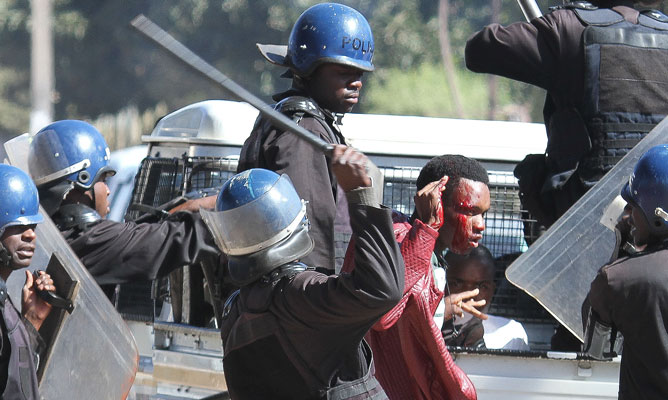
The spectacular collapse of the treason case against #ThisFlag movement leader and pastor Evan Mawarire last week was the latest signal that Zimbabwe’s highly politicised police force needs urgent reform.
Comment
The Zimbabwe Republic Police (ZRP) is shamelessly partisan and we need not look further for evidence of this unprofessionalism than the force’s reaction to popular protests against President Robert Mugabe’s leadership that have been erupting everywhere across the country of late.
Police commanders have been quoted parroting the amateurish Zanu PF propaganda line that the protests that began in Beitbridge last month over the unpopular decision to ban imports were being driven by the so-called third force.
The police have descended heavily on protestors exercising their democratic rights to protest against the ruling party’s failure to address corruption and the worsening economic decline.
Mawarire was initially arrested on Tuesday for allegedly being in possession of a stolen police helmet, button stick (sic) and other “subversive material” which he intended to use for public violence.
The laughable charges were altered the following day and he was now being accused of trying to overthrow a constitutionally elected government through the peaceful protests.
- Chamisa under fire over US$120K donation
- Mavhunga puts DeMbare into Chibuku quarterfinals
- Pension funds bet on Cabora Bassa oilfields
- Councils defy govt fire tender directive
Keep Reading
However, the magistrate wasted no time in throwing out the charges and accused the police of violating the pastor’s rights.
Mawarire joined the ranks of Joshua Nkomo, Renson Gasela, Morgan Tsvangirai, Paul Siwela, Lookout Masuku, Ndabaningi Sithole and Dumiso Dabengwa, among others who have been persecuted by the police using the same legal instrument.
Besides Mawirire’s case, the police have also come under fire for allegedly torturing suspects during a clampdown that followed a series of protests in Bulawayo and Harare a fortnight ago.
The Zimbabwe Human Rights Commission last week visited Burombo Flats in Bulawayo, where most of the victims of the police brutality stay and promised to investigate the criminal conduct.
ZRP spokesperson Senior Assistant Commissioner Charity Charamba also claimed police were investigating a video that showed officers torturing residents in Harare.
However, Charamba left us without any doubt that the so-called investigation would not be neutral.
She said police were not ruling out “that the video could have been manufactured by perpetrators of violence to make people angry and incite violence.”
Such statements cannot be associated with a professional police and are shameful.
ZRP could take a leaf from the way South African police handled similar demonstrations by Zimbabweans in Pretoria and Cape Town last week.
There have also been protests in the United Kingdom and Australia where Zimbabwean citizens were allowed to exercise their democratic rights without any hindrance from law enforcement agents.
ZRP’s partisanship was further shown by attempts to block the MDC-T’s #beatthepot demonstration in Bulawayo yesterday.
The High Court ruled that the attempted ban was unlawful and the protest went ahead without any incidence.
There are far too many other similar cases where the courts had to intervene to force the police to discharge their duties professionally.
Elsewhere in this publication, Home Affairs minister Ignatius Chombo tried in vain to defend the police but it is clear to everyone that ZRP is compromised.
It is high time that the force is depoliticised so that it can serve all Zimbabweans without fear or favour instead of operating like a ruling party militia.












